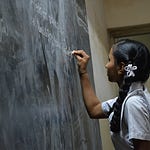(Source: https://unsplash.com/photos/YZsvNs2GCPU)
Educators working at the global level formulate initiatives considering the needs and aspirations of the broad community. These initiatives answer two fundamental questions. First, why people should get an education? Second, what to teach? A set of objectives and outcomes that need to be attained over a specific period are defined as an answer to the first question. While a set of generic knowledge and skills that need to be imparted answers the second. Further, these initiatives identify challenges in implementing educational programs. This section reviews some of the recent initiatives in terms of objectives, skills, and challenges.
Education for All
Educational For All (EFA), an initiative formulated in 1990, is considered a historical milestone in building a global perspective on education. Six goals are included in EFA. The EFA initiative has emphasised providing equitable and inclusive education and expanding the reach of education to girls, children, and members of disadvantaged communities. The objective is to reduce the gender inequality present in society. Further, this initiative aims to provide basic literacy, numeracy and life skills. This initiative adopts a {\em transformative perspective}. It suggests that nations formulate country-specific educational policies considering the local culture, language, aspirations, and gender issues. Later on, following this declaration, the UN has included {\em Quality Education} as one of the Sustainable Development Goals.
Indian Initiatives for providing Quality Education
The following are some of the initiatives undertaken by the Indian government in response to meet either the Millennium Development Goals or Sustainable Development Goals.
Sarva Siksha Abhiyan (SSA) This program was formulated in response to EFA by the Indian government, and it makes education to children between the ages of 6 to 14 a fundamental right. This program guarantees basic primary education to children. The program was expected to end in the year 2010. Subsequently, it has been evolved in other programs having the similar objective of universalising primary education. The evolved programs extend the scope to secondary education and improve children's literacy and numeracy between the ages of 6 to 14. These programs are Rashtriya Madhyamik Shiksha Abhiyan and Samagra Shiksha Abhiyan.
Rashtriya Uchhatar Abhiyan (RUSA) This program is an initiative by the Indian Government to standardise and improve the quality of higher education. Some of the measures suggested in RUSA include: (i) to appreciate all higher education programs offered by colleges. (ii) to increase the number of autonomous institutes (iii) To reform curricula and examination systems. (iv) To convert some of the universities into research universities. (v) to provide adequate opportunities for higher education to students belonging to scheduled castes, tribes and disadvantaged people.
Technical Education Quality Improvement Program This is a world bank funded initiative undertaken by the government of India to improve the quality of technical education in the country. It identifies and funds technical education institutes across the country to strengthen physical infrastructure, to build the capacity of engineering teachers, to provide scholarships to engineering graduates for pursuing post-graduate and doctoral studies, and to provide adequate opportunities for technical education to students belonging scheduled castes, tribes and disadvantaged people.
Pandit Madan Mohan National Mission on Teachers Training This program aims to build the capacities of teachers. This program funds and encourages to establishment of dedicated centres for teachers training. The goal of the program is to create dedicated physical infrastructure facilities for conducting teachers training programs on pedagogy, advanced topics, and basic skills like problem-solving, critical thinking, and to develop educational leadership abilities.
Challenges to impart Quality Education
Developing and under-developed countries face many challenges in their effort to provide quality education for all. These challenges stem from social background, cultural background and economical factors. Some of such causes why many nations fail to impart quality education are described below.
Socio-Economical factors Poverty is one of the major reason why students fail to get an education. People fail to pay fees, buy books and lack of sufficient funds. Some of the other social factors responsible for low attendance at schools and early dropouts are hunger, diseases, cultural bias towards girl education, members of nomadic tribes and violence in the community or parental conflicts at home.
Outdated Curriculum offered at schools and colleges Students show less interest in getting educated when the educational programs fail to match with aspirations with respect to employment and entrepreneurship.
Learning Environment Students show a lack of interest when school or colleges are located at faraway places, institutes lack proper infrastructure and under-qualified or untrained staff.
The following episodes describe the technologies to address some of these challenges. Mainly these technologies are helpful to improve the quality of education in terms of accessibility, expanding reach to a broader level, effective delivery instruction and assessment.












Share this post